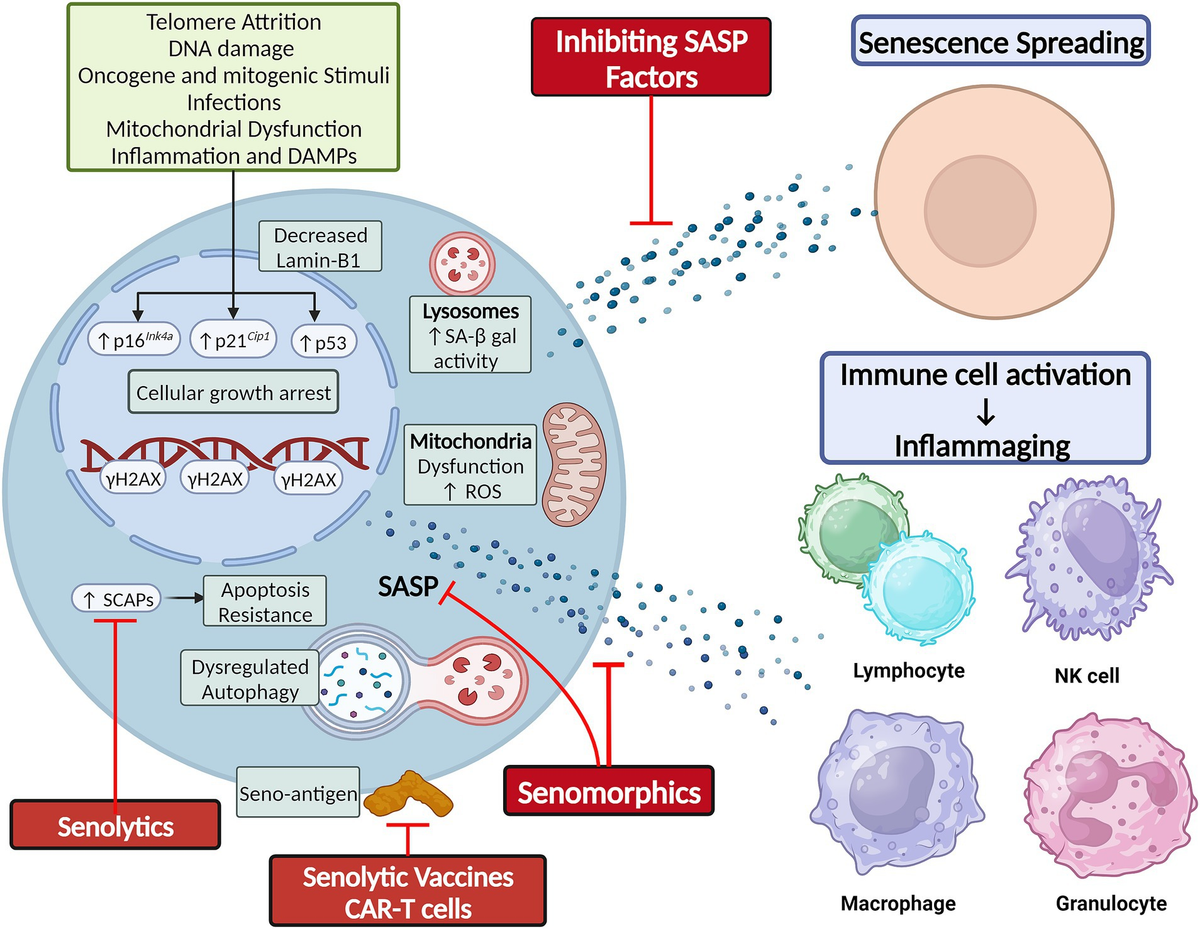How Does Growing Up Change Our Brains?
Learn how aging changes your brain and discover practical tips to stay sharp. Explore memory shifts, brain health strategies, and innovative treatments like senotherapies. Stay mentally strong and embrace aging with confidence through healthy habits and the latest scientific insights.
Getting older is a natural part of life. As we grow, our bodies and minds go through many changes. One of the most interesting changes happens in our brains. Learning about these changes can help us handle the challenges of getting older and find ways to keep our minds strong. In this guide, we will talk about different ways our brains change as we age. We will look at how we think, what our brains look like inside, how our nerve cells work, and the chemicals in our brains. We will also share tips on how to keep your brain healthy as you grow up.
As we live longer, our brains change in many ways. These changes affect how we think, feel, and get along with others. Brain aging means that some parts of our thinking might slow down, our brain's shape might change, and the tiny cells and chemicals in our brains work differently. While some changes are just part of getting older, we can take steps to keep our minds sharp and healthy.

Cognitive Changes in the Aging Brain
One major change in how as we age is the difference between fluid intelligence and crystallized intelligence. Fluid intelligence is our ability to solve new problems and think quickly. Crystallized intelligence is the knowledge and skills we've built up over time.
As we get older, fluid intelligence often decreases. This means think more slowly and find it harder to solve new problems. So, crystallized intelligence usually stays the same or even improves. Older adults often have better vocabulary and reasoning skills because of their life experiences and knowledge.
Memory and Processing Speed
Memory is a key part of how we think, and aging affects different types of memory.
Working memory, the brain's mental scratchpad for temporarily holding information, tends to weaken. This can make it harder to follow multiple-step instructions or remember information long enough to use it.
Processing speed, or how swiftly our brains absorb and interpret information, also declines with age. Tasks like reading or responding in conversations may need more time and effort. But, some types of memory, like long-term memory, can stay pretty good as we age.
Enhanced Verbal and Abstract Reasoning
Even though some thinking abilities decline, others can get better as we age. Verbal abilities often improve, helping older adults communicate more clearly and effectively. Abstract reasoning, or the ability to understand complex ideas, can also get better, allowing for deeper insights and more advanced problem-solving.
Structural Changes in the Brain
As we age, our brain undergoes structural changes. One of the most noticeable changes is a decrease in brain size. This shrinkage happens because we lose some neurons and the connections between them. The cerebral cortex, the brain's outer layer responsible for higher thinking, also becomes thinner, especially in areas like the frontal and temporal lobes.
Cortical thickness shows how healthy and functional the brain is. Thinning of the cortex can affect decision-making, planning, and understanding language. This shrinkage starts gradually around age 30 and speeds up in later years.
Atrophy of Key Brain Regions
Some parts of the brain are more affected by shrinkage than others. The prefrontal cortex, important for reasoning and impulse control, shrinks significantly. The cerebellum, essential for movement and balance, shrinks, and the hippocampus, vital for memory and navigation, diminishes significantly.
When these areas shrink, it can lead to changes in behavior and thinking abilities. For example, a smaller hippocampus is linked to memory problems, while a smaller prefrontal cortex can make it harder to plan and make decisions.
Neuron and Synapse Decline
On a microscopic level, neuronal changes are key to understanding brain aging. The number of neurons, or nerve cells, decreases as we age. Additionally, the connections between neurons, called synapses, become fewer and weaker. This decline makes it harder for the brain to communicate efficiently, leading to slower thinking and less capacity for learning.
Neurons may also shrink, and their branches, known as dendrites, become less complex. These changes contribute to the decline in brain function seen in older adults.
Neurogenesis and Its Limitations
Your brain is always working, even when you're sleeping. One cool thing your brain does is make new brain cells. This process is called neurogenesis. When you're young, your brain makes lots of new cells. But as you get older, it slows down a bit. There's a special part of your brain called the hippocampus that keeps making new cells all your life. But, because fewer new cells are made, your brain has a harder time fixing itself and learning new things.
Another important thing is called cellular senescence. This is when some of your brain cells stop working well and don't make new cells anymore. These old cells start to build up in your brain over time. When this happens, it's harder for your brain to create new neurons, and the connections between your brain cells become weaker.
Scientists are working on new treatments called senotherapies. These treatments aim to remove the old, tired cells from your brain. By doing this, they hope to slow down how fast your brain ages and keep your thinking skills strong.
Even though making new brain cells slows down, you can still help your brain stay healthy. Exercise and challenging your mind with puzzles or learning new things can encourage your brain to make more neurons. Plus, your brain can still create new connections, which helps you stay smart and remember things better.
Chemical Changes Affecting Brain Function
As you get older, the chemicals in your brain change. These special chemicals, called neurotransmitters, help your brain cells talk to each other. When you age, your brain makes less of these chemicals.
Two important neurotransmitters are dopamine and serotonin:
- Dopamine helps you feel happy when you do something good and helps you move your body.
- Serotonin helps you feel good, controls your appetite, and helps you sleep.
When there is less dopamine and serotonin in your brain, you might feel sad, have trouble staying excited, or find it harder to focus on things.
Impact on Mood and Cognitive Function
The drop in neurotransmitter levels is closely linked to changes in mood and thinking as we age. Less dopamine can make it harder to plan, rank, and complete tasks. Lower serotonin levels are linked to mood disorders like depression and anxiety, which can make cognitive decline worse.
Chemical imbalances can also disrupt how brain cells communicate, making thinking less efficient. Research indicates that cellular senescence contributes to these chemical changes, with senescent cells releasing a senescence-associated secretory phenotype (SASP) that causes inflammation and messes up normal neurotransmitter function.
Expert opinion from Dr. James L. Kirkland, a leading researcher in cellular senescence, emphasizes that "targeting the SASP could be a key strategy in mitigating the chemical imbalances that underlie cognitive decline in aging."
Understanding these chemical changes is important for developing ways to support mental health and thinking skills in older adults.
Cellular Senescence and Brain Aging
Cellular senescence is when cells stop dividing and don't work right because of problems like damaged DNA or too much stress. This helps protect us from cancer by stopping bad cells from growing. But if there are too many senescent cells, it can make us age and get sick.
In the brain, cellular senescence affects different kinds of cells, like neurons, astrocytes, and microglia. Senescent cells release chemicals that cause inflammation, called the senescence-associated secretory phenotype (SASP). This SASP makes a long-lasting, small amount of inflammation in the brain, known as neuroinflammaging, which can lead to memory problems and diseases like Alzheimer's.
Recent studies by Ogrodnik and others (2021) have found that taking away senescent cells from the brains of older mice lowers inflammation and slows down memory loss. This shows how important cellular senescence is in how our brains age.
Senotherapies and Their Potential
Because senescent cells can hurt our brains, scientists are creating senotherapies to remove or change these cells. Senolytics are medicines that specifically kill senescent cells, while senomorphics are things that stop senescent cells from making harmful chemicals without killing them.
Scientists are testing these senotherapies to see how well they work for treating diseases that make thinking harder. For example, senolytic drugs like dasatinib and quercetin reduce senescent cells in the brain. They also lower inflammation and slow down thinking problems in animal studies.
Dr. Tamara Tchkonia, a leading expert in senescence research, says that "senolytics could help not only treat diseases that come with getting older but also improve brain health and thinking skills in older people."
Yet, there are challenges with senotherapies. Cellular senescence is important for things like healing wounds, growing, and preventing cancer. So, it’s important to target senescent cells without messing up these important processes. Also, we don’t know what the long-term effects of senolytics and senomorphics are in humans yet. Researchers need to do more testing.
Impact of Brain Aging on Daily Life
The changes in the brain as we age lead to various challenges in daily life. Common difficulties include:
- Forgetting names or words: Struggling to recall specific information.
- Slower task completion: Taking longer to finish activities that were once easy.
- Struggling in noisy environments: Finding it hard to focus and follow conversations with distractions.
- Misplacing items: Forgetting where you put things, which causes frustration
- Difficulty with decision-making: Feeling uncertain or hesitant when making choices.
These changes can affect work, relationships, and quality of life.
Coping Strategies and Lifestyle Adjustments
To handle these thinking changes, you can use strategies and make changes to how you live to stay independent and keep your mind healthy. Some good ways are:
Routine and organization: Keep the same schedule every day and use things like calendars and to-do lists to manage your daily tasks.
Mindfulness and meditation: These are activities that help you focus and feel less stressed, which can make your thinking and feelings better.
Healthy diet: Eat a balanced diet with foods that have antioxidants, omega-3 fatty acids, and other nutrients that help your brain stay healthy.
Adequate sleep: Make sure to get enough rest, which is important for your memory and thinking skills.
Mental exercises: Do puzzles, read, and other activities that challenge your brain to help keep your thinking abilities strong.
Supporting Brain Health in Aging
Physical Exercise
Staying physically active is one of the best ways to keep your brain healthy and slow down brain aging. When you exercise regularly, more blood flows to your brain. This gives your brain important nutrients and oxygen. Exercise also helps make something called Brain-Derived Neurotrophic Factor (BDNF), which is a protein that helps your brain cells grow and stay strong.
Studies have shown that doing physical activities often can make your thinking better, slow down the decline of your brain's abilities, and reduce the chance of getting diseases like Alzheimer's and Parkinson's. Activities like walking, swimming, and weight training are especially good for your brain.
Expert opinion from Dr. Ibrahem Albalkhi says that "doing regular physical activity not only makes your heart healthy but also helps keep your brain strong as you get older."
Cognitive Stimulation
Keeping your brain active through cognitive stimulation helps maintain and even improve thinking skills. This involves activities that need you to think, solve problems, and learn new things. Examples include:
- Learning a new skill or language: Helps form new connections in the brain.
- Playing musical instruments: Enhances memory, coordination, and flexibility in thinking.
- Participating in strategy games: Improves planning, decision-making, and analytical skills.
- Reading and writing: Expands knowledge, vocabulary, and understanding.
These activities keep your brain engaged and support neuroplasticity, which is the brain's ability to form new connections and stay flexible.
Social Engagement and Emotional Well-being
Strong friendships and emotional health are very important for keeping your brain healthy as you grow older. Social engagement gives your brain something to think about, helps you feel less lonely, and provides emotional support. Spending time with others can make you feel happier, more confident, and more satisfied with your life.
Also, activities like mindfulness, meditation, and therapy can help you manage stress, worry, and sadness, which can affect how your brain works. Making good friends and joining community activities help keep your mind happy and strong.
Keeping Our Brains Healthy
As we get older, our brains go through many changes. Brain aging affects how we think, the shape of our brains, how our nerve cells work, and the chemicals that help brain cells talk to each other. Cellular senescence is a big part of this. It causes swelling inside the brain, fewer new brain cells, and weaker connections between nerve cells. While it's normal for some thinking skills to get a bit slower, knowing about these changes helps us take care of our brains.
Living a healthy life by exercising regularly, challenging our minds, and spending time with friends and family can help lessen the effects of brain aging. Plus, there are new treatments called senolytics and senomorphics that aim to slow down these brain changes and make our brains healthier.
Experts believe that "combining healthy habits with advanced treatments that target senescent cells could change how we keep our brains healthy as we grow older." This means we can stay independent and keep our minds sharp even when we’re much older.
By using simple strategies to handle everyday thinking challenges and focusing on keeping our brains healthy, we can age with strength, energy, and clear thinking. As scientists continue their research, new discoveries and treatments will help us support our aging brains, making sure we live happy and healthy lives as we grow older.
Sources:


